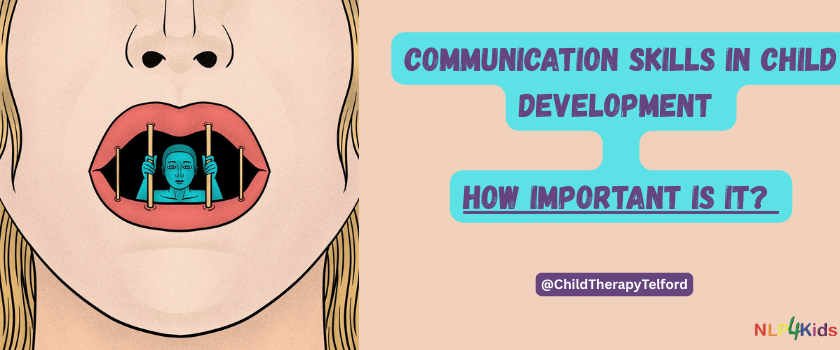Communication Skills in Child Development – How Important Is It?

Effective communication skills are vital for a child’s growth, influencing their ability to listen, understand, and express themselves. The following discusses the significance of these skills, particularly in combating anxiety and depression, and highlights how they affect a child’s future well-being and educational success.
Understanding and addressing communication difficulties early on is fundamental, as it can lead to a more fulfilling life for children. By fostering these skills through methods such as Neuro-Linguistic Programming (NLP), we can help children direct their emotions and build resilience.
The Foundation of Communication Skills
While learning vocabulary and sentence structure is important, the essence of communication lies in interactive dialogue. Two-way communication enables children to grasp concepts more effectively, making academic subjects easier to understand. In the UK, the communication charity I can www.icancharity.org.uk reports that around 10% of primary school children, particularly in deprived areas, face communication difficulties that often go unnoticed until they encounter serious issues later in life.
Engaging children in confident, active communication helps them articulate their thoughts and feelings. When they can express themselves clearly, they are better equipped to handle social situations and manage mental well-being. This foundational skill is essential for a child’s emotional and intellectual development.
The Impact of Communication on Education
Research indicates that communication skills extend beyond language arts; they are integral to every academic subject. Children who struggle with communication may find it challenging to engage with their lessons fully, leading to a cycle of frustration and anxiety. The long-term consequences of unaddressed communication issues can be severe, affecting academic success and future opportunities.
A Tool for Socialisation
Communication skills are not just about academic learning; they play a crucial role in socialisation. Children learn how to interact with their peers and adults through effective communication, which, in turn, influences their ability to cope with anxiety and other emotional challenges later in life. A strong foundation in communication allows children to form meaningful relationships and navigate social complexities with ease.
Additionally, internal communication, the way children talk to themselves, plays a significant role in their mental health. Positive self-talk can alleviate anxiety and build confidence, while negative internal dialogue can exacerbate feelings of inadequacy and stress. Encouraging children to develop a healthy internal narrative can empower them to face challenges head-on.
Neuro-Linguistic Programming (NLP)
Neuro-Linguistic Programming (NLP) is a powerful approach that can enhance communication skills in children. By understanding the connection between neurological processes, language, and behavioural patterns, NLP can help children reframe their thoughts and reduce anxiety. Techniques such as visualisation and positive affirmations can transform negative thought patterns into constructive ones, promoting emotional resilience.
In a therapeutic setting, NLP can equip children with tools to manage their emotions, allowing them to express themselves more clearly and confidently. This proactive approach not only addresses existing communication issues but also fosters lifelong skills that will benefit them in various aspects of life.
The Broader Implications of Effective Communication
When children learn to communicate clearly, the benefits extend beyond individual success. Improved communication fosters a more balanced environment within families and classrooms, reducing conflict and creating a calm atmosphere conducive to learning. This ripple effect can transform entire communities, showing how essential communication skills are for societal wellbeing.
Furthermore, the mental health of children is significantly influenced by their ability to communicate. As mentioned, effective internal dialogue can mitigate anxiety and depression.
According to recent statistics, approximately 1 in 6 children in the UK aged 5-16 experience mental health issues (NHS Digital, 2024).
By promoting effective communication skills, we can help reduce this alarming statistic and improve the overall mental health landscape for future generations.
The ability to communicate effectively is foundational to a child’s development and future success. By prioritising communication skills, we are not only enhancing academic performance but also equipping children to manage anxiety and build healthy relationships. Neuro-Linguistic Programming offers valuable techniques to nurture these skills, ensuring that children can express themselves freely and confidently.
As parents, educators and caregivers it is our responsibility to recognise and address communication difficulties early on. By doing so, we can help create a generation of resilient individuals who are prepared to face life’s challenges with clarity and confidence. Investing in our children’s communication skills today will pave the way for a brighter future, both for them and for society as a whole.
For more information on how NLP4Kids can help and support young people with communication skills, visit Child Therapy Telford.
https://childtherapytelford.nlp4kids.org
Book a FREE  consultation with Child Therapy Telford.
consultation with Child Therapy Telford. 
https://louisa-nlp4kids.youcanbook.me
 07966 819194
07966 819194
 louisa@nlp4kids.org
louisa@nlp4kids.org
The original version of this article was written by Gemma Bailey, director of www.NLP4Kids.org. It was republished and rebuilt with additional content by Louisa Gauld-Crichton – Child Therapy Telford. https://childtherapytelford.nlp4kids.org
Leave a comment
This site uses Akismet to reduce spam. Learn how your comment data is processed.

Leave a Reply